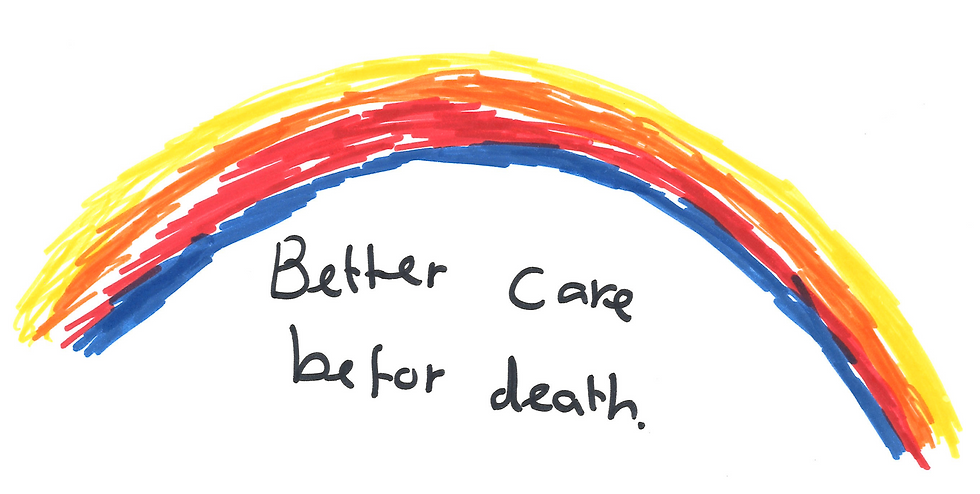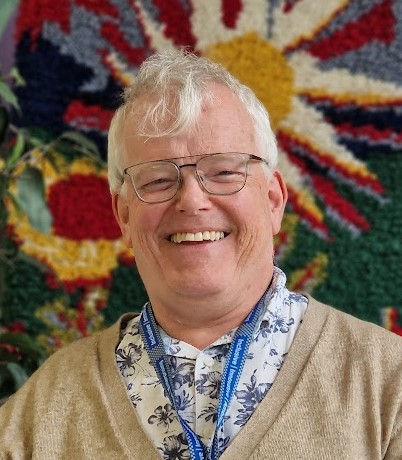Blog 29. Happy first birthday to the DAPPLE Project!
- Irene Tuffrey-Wijne

- Sep 4, 2025
- 4 min read
Updated: Nov 19, 2025

Irene says:
This is a study I have wanted to do for a very long time. My previous studies have focused on the experiences of people with a learning disability at the end of life; their information and support needs; breaking bad news; staff training and support needs (from palliative care nurses to support workers); end of life care planning.
Conclusions from these studies almost always include the need for everyone to work together (that’s healthcare services, social care services, families) and put the patient at the centre of everything. But also, the need for a culture shift, where staff and families are less afraid to talk about dying and healthcare staff are less worried about their ability to support people with very diverse needs.
What I really wanted to know was: How on earth do you achieve this COLLABORATION that is at the heart of all good practice examples? What is the best way to organise and support services and staff, so that they can provide patient-centred care again and again, not relying purely on that wonderful nurse who always gets it right and champions people?
The DAPPLE Project is focused not just on one aspect of care, or one group of caregivers/receivers, but on all of it. We are looking at what helps and hinders good care, from all angles and from everyone’s perspective – from the commissioner who pays for the services to the home manager, the nurse who provides care, the person who receives it, and that person’s sister who is their advocate and champion.
Becky says:
Let me tell you what we’ve got up to in our first year. We have just submitted our first annual report to the National Institute for Health and Care Research (NIHR), which is funding the project. On a big project like this, it can be easy to focus on all the things you still have to do, but this was a good opportunity to think about everything that we have achieved in the first year. Writing it all down for the report really showed how everyone in the team has contributed to this. We have:
Built our big research team, welcoming quite a few new faces. We also got together an Advisory Group and a Study Steering Committee, who meet to give us advice and keep us on track.
Got to know each other, figured out who does what, done some training and worked out what we each need to learn more about. There’s always plenty of fun and laughter along with the hard work.
Looked at national databases. The team at the University of Leicester has looked at information about people with a learning disability who have died. They crunched the numbers to see what we can learn about their needs and their use of healthcare services, and compared this with the general population. This work is almost finished!
Looked at the literature. The team at The Open University has found lots of articles and other information related to our research questions. They are now reading it, to see what is already known. They will summarise everything by the end of the year, so we can all learn from it.
Got to know the services in 4 study sites. Our study sites are South London (Croydon), West Yorkshire (Kirklees, Calderdale and Wakefield), Bedfordshire, Luton and Milton Keynes, and Leicester, Leicestershire and Rutland. Our researchers have spent time talking to the service providers, commissioners, managers, staff in hospitals, learning disability services and palliative care services. Some of these were formal interviews, but there were also a lot of informal chats. We attended a lot of meetings to find out how things work locally (and to talk about the DAPPLE project). The team at the Open University have written about the formal interviews and will publish an article about it soon.
Got together a co-production group of people with a learning disability. The co-production team went on what they called their “road show”, meeting self-advocates in our study sites, holding workshops involving hats, pictures and art materials. Some of these self-advocates have now joined our monthly online group. They will help us make sense of our study findings. Their first job was to come up with a name for their group: Better Care Before Death group!

Got ethical approval for doing ethnographic field work and interviews. If you know about ethical approvals, you will understand the complexities (it involved a HUGE amount of forms). If you don’t know about it, count yourself lucky, and I won’t bore you with the details. Our researchers are going to spend time with people with a learning disability who have palliative care needs, so it’s very important to get this right. But it wasn’t an easy process! However, we now have the green light. We can start recruiting our study participants!
Spread the word. We have talked at conferences, written these blog posts and flagged our work on social media. We don’t want to do this work on our own. We want you to know about it, so you can help and support us by telling is what you think.
Becky and Irene say:
So much to look forward to this year. We are kicking off a webinar series (starting with DAPPLE presentations in November – watch this space). We will begin our ethnographic field work (posh word for spending time with people, to learn what is happening in their lives and what matters to them). And so much more.
We will continue to keep you posted. Watch this space!







Comments